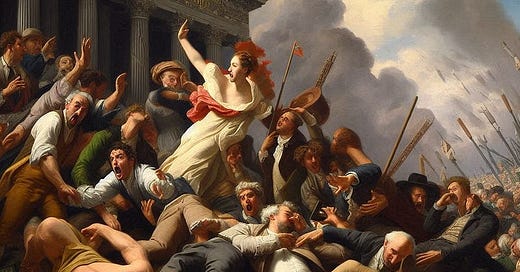Well, folks, it’s official:
Millennials have survived Y2K, 9/11, countless wars, two economic recessions, a global pandemic, a permanent housing affordability crisis, compounding currency devaluation, social media mind virus screen addiction, and now — if you believe the news — a stock market crash.
Just look at this horrifying graph of the S&P 500:
In the past week, headlines around the world have blared the terrifying news:
The stock market plunged a whopping 335.97 points.
What are we to make of this?
How did it happen?
Why does it matter?
And what does it mean for everyone who is struggling to make ends me?
Let’s dig in:
1. This is a fake stock market crash
I was being a bit cheeky with my screenshot of the “crash.”
If you put it in its historical context, this barely registers as a blip:
Not so crashy now, is it?
The S&P 500 “plummeted” a “whopping” 335.97 points… from 5522.30 to 5186.33.
The market temporarily dipped by a measly 6%.
In other words:
This wasn’t even a stock market crash.
Because words have definitions, remember?
5% fall: Pullback
10% fall: Correction
20% fall: Bear market
30+% fall: Crash
This 6% dip isn’t even a correction.
Correction: That correction is already correcting:
That’s right: Of the 6% down, it’s already back up 4%.
So the net “loss” is only 2%, which can recover as fast as an Elon Musk tweet.
2. So why are people calling it a crash?
For clicks.
Social media is fuelled by fear, rage, and endless distraction.
So calling a 2% micro-dip a stock market crash is good for tens of millions in revenue for media companies and social media platforms.
Remember the business model, sheeple:
Your eyes stayed glued to screens → social media makes money by showing you ads → they find another cortisol-spiking story → repeat.
3. How the “crash” happened
In a word: Greed.
In three words: History repeating itself.
In a few more words:
Parasite investors bet heavily on tech stocks in hopes that artificial intelligence would make them rich despite creating and contributing zero new useable wealth to society.
Some even borrowed Japanese yen at historically-cheap interest rates to fuel their money-worshipping mania.
Japan raised their interest rates slightly and NVIDIA, the leading chipmaker, announced it might delay the launch of its new AI processor.
Aaaand poof — $1 trillion in market cap wiped out instantly.
If only there were dozens of historical precedents where greedy investors borrowed to fuel bubbles that eventually popped…
4. It’s all paper losses
No one got fired.
Production didn’t slow down.
People didn’t stop buying things.
All that actually happened was that a few gamblers had to sell a tiny percentage of stocks to other gamblers for slightly cheaper prices.
5. Real stock market crashes only make things worse
Just look at 2008.
When real crashes (30+%) occur, rich people swoop in and buy up companies, fire thousands of people, slash benefits, raid pensions, and perpetrate all sorts of anti-wellbeing frauds.
Right now, Warren Buffett is sitting on a Smaug-like hoard of nearly $300 billion in cash and equivalents, just waiting for a crash so he can pounce.
What is wrong with people?
Why are we okay with living in a world this evil and opportunistic?
6. Shareholders are parasites
The Bible talks alot about righteous gain and unrighteous gain.
All shareholder profit — both dividends and capital gains — are stolen off the backs of the actual workers who farm the fields, bake the bread, stitch the Nikes, and build the autonomous car manufactories.
Remember: For 99% of human history until a few hundred years ago, shareholders weren’t necessary for civilization to create valuable goods and services for others.
Today, the truth that these parasites add nothing to society is unfathomable.
But the facts remains: Shareholders are takers, not makers.
100% of shareholder profit is just wage suppression… the entire concept of shareholder profit is to 1.) push down worker pay and 2.) maximize consumer price to create a fat margin.
Counter to the myth of capitalist efficiency, today’s vulture capitalism delivers the exact opposite of efficient wellbeing.
Shouldn’t we want low prices and high pay instead of the other way around?
Obviously.
But capitalism is all about incentives, and shareholders are incentivized to give us high prices and low pay.
Want to know why society is falling apart?
Ask the people who are passively profiting from all your hard work.
Want to know where all this is heading?
Just do the math.
Shareholder profits will continue to compound, while the real, actual, productive, worker’s economy struggles incrementally, weighed down by its enslavement to passive extractors.
It’s an evil system, and nothing will change until people change.
Sell your stocks and bonds.
Work with your own hands.
Create new value for others.
Do the right thing now or things will get far worse.
Watch Jared A. Brock’s documentaries about slavery and trafficking and read his myth-busting biography about Jesus’s politics, economics, and philosophy.







